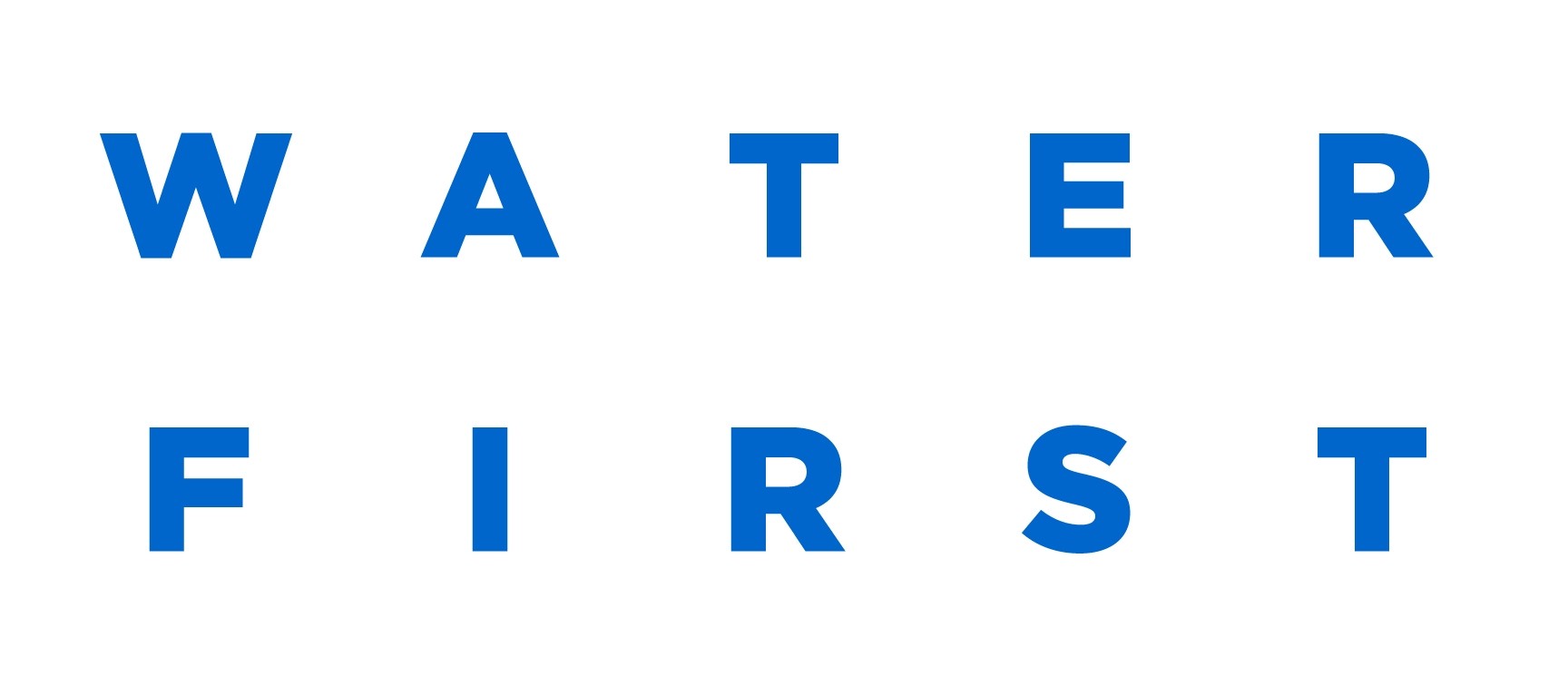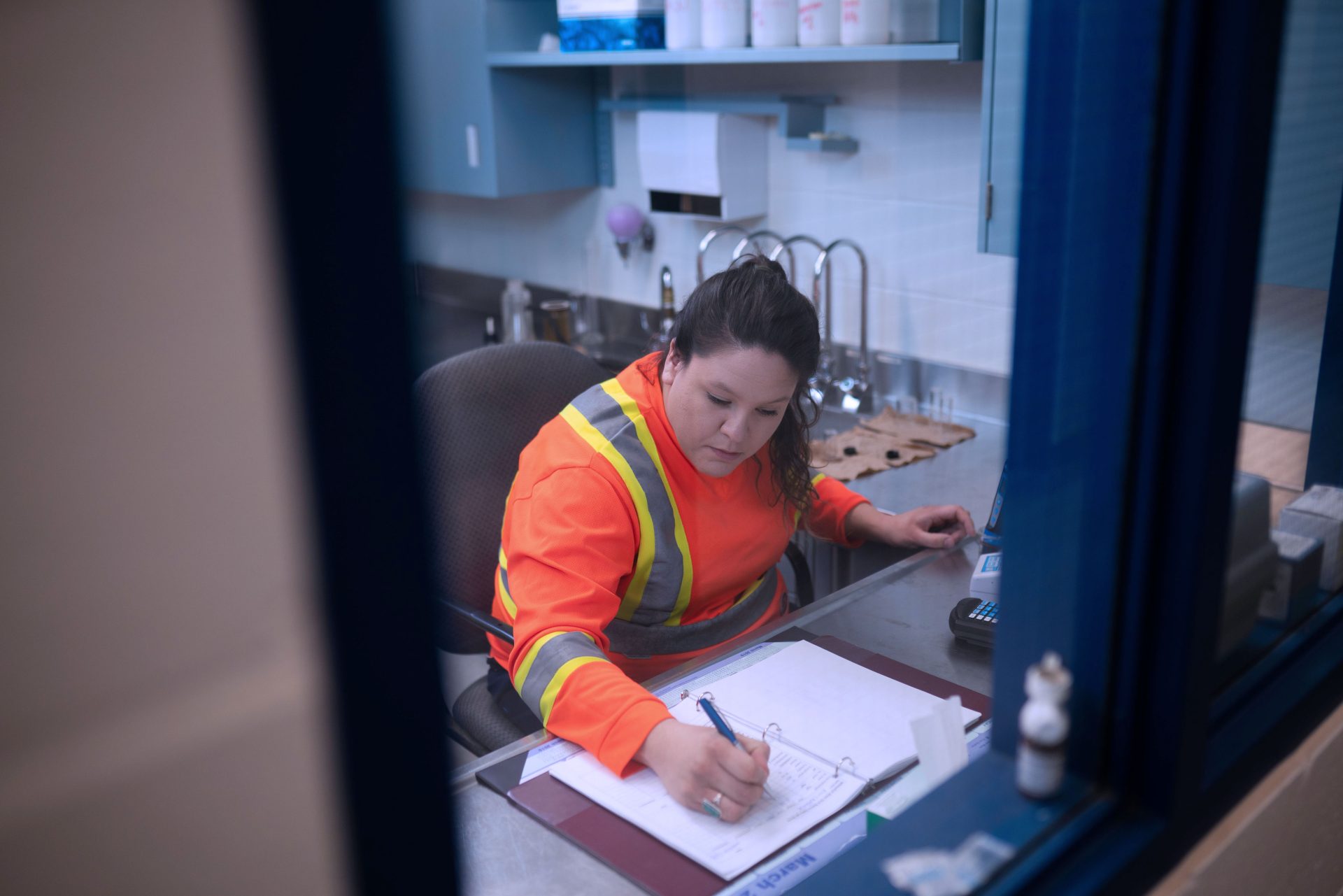Making waves with the
Environmental Water Program
Environmental Water Program | Spring 2023
Water First and Naskapi Nation keep making waves!
Water First’s partnership with the Naskapi Nation of Kawawachikamach, a community in northern Quebec, is a story of long-term collaboration. Starting in 2018 (making it our longest active project to date), the collaboration has seen the successful completion of three projects aimed at supporting the community to monitor lake health in the region, which is experiencing an increased interest in resource exploration. And the collaboration keeps getting stronger.
In 2022, Water First staff visited Kawawachikamach three times to deliver skills training to interns and community members. The interns were eager to participate in the training workshops on their own lands, which included conducting fish habitat surveys and creating an environmental baseline.
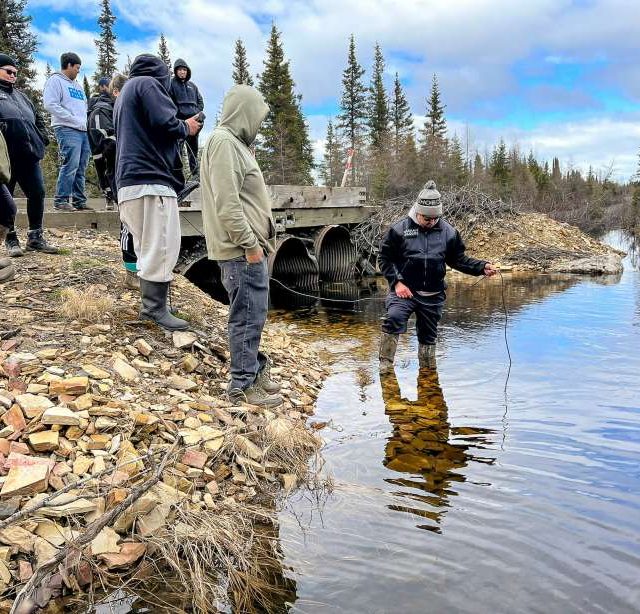
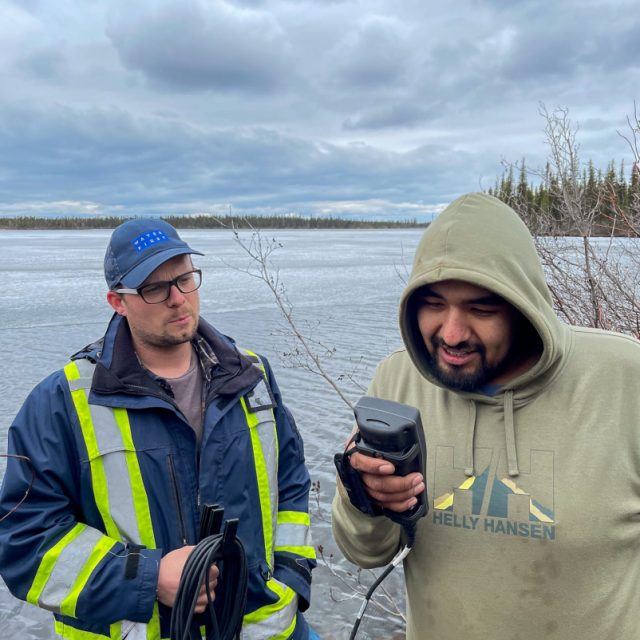
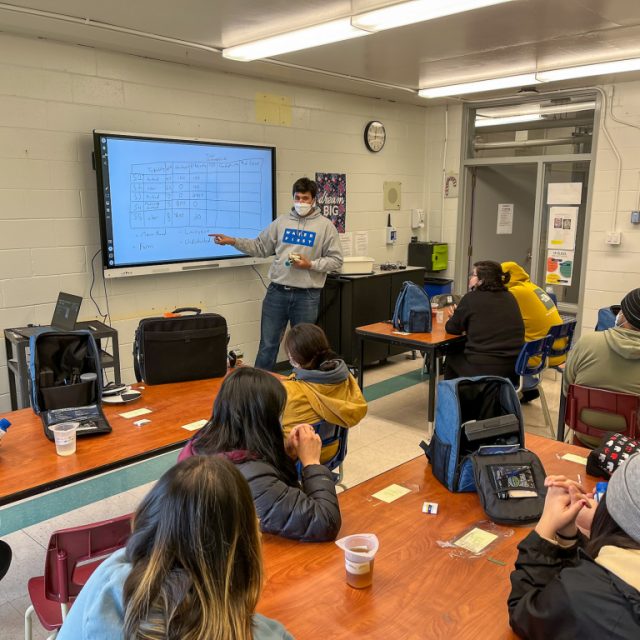
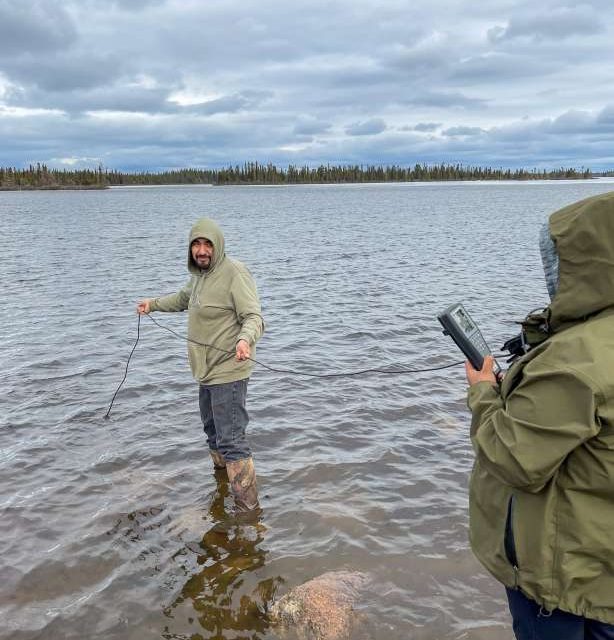
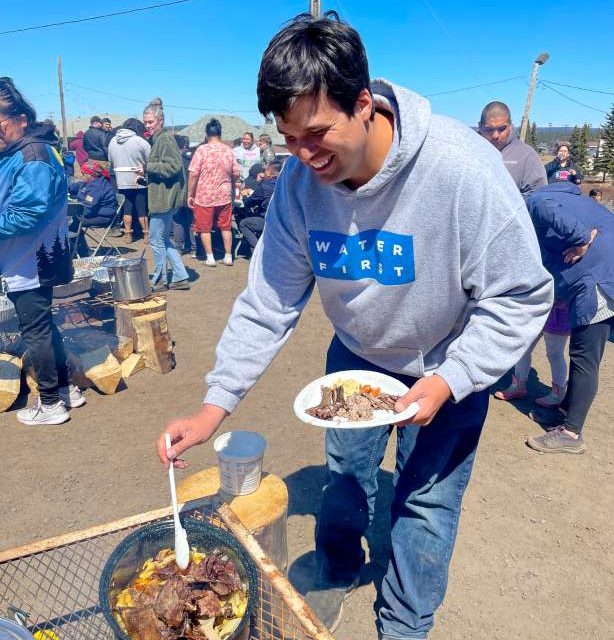
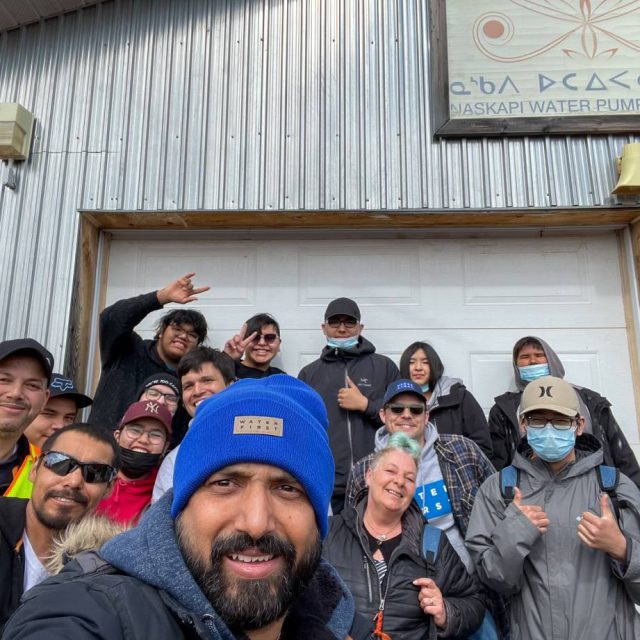
Thanks to the long-term nature of the relationship, Environmental Interns from past projects shared their knowledge from previous training with new interns to help the team pick up the skills they needed.
Each week during the training, the interns sampled water at several locations around their community before transitioning into fish habitat assessment work in July. This water quality data formed a valuable baseline for their region, and the sampling trips helped keep their knowledge and skills sharp.
During the visit in August, the team joined the community’s 10th annual fishing derby, where they collected data such as length, weight, and sex from the fish that were caught, as well as samples to send to labs for analysis.
The Environmental Water team wasn’t the only Water First presence in Kawawachikamach. Last May, Dillon from the Schools Program team visited the community to deliver a workshop to students at Jimmy Sandy Memorial School. Two students, Jaylen and George, enjoyed the workshop so much that they ended up getting hired by the Environmental Water Program to work throughout the summer months, learning how to do water and fish sampling and proper protocols for handling and processing the samples project!
Kabimbetas (Noah) Mokoush, a former Environmental Water intern, also visited the school to help deliver a workshop and explained water science concepts to the students in the Naskapi language. Hearing the concepts in their own language, explained in a more familiar context, helped the students to grasp how watersheds work.
Water First’s partnership with the Naskapi Nation of Kawawachikamach has been a significant, long-term collaboration. We are grateful for the opportunity to work together, and we look forward to more successes in the future.
Climate monitoring with Brunswick House First Nation
In June 2022, Water First partnered with Brunswick House First Nation (BHFN) to create a climate monitoring plan for the Mountbatten Reserve to track the impacts of climate change on lands and waters. Water First team members Cory Savage and Tanya Sackaney began the project by identifying six survey sites on six different lakes in Mountbatten and providing hands-on training to a three-intern team of young Indigenous adults from BHFN. The interns — Santana, Paradise and Shawn — dedicated two months over the summer to sampling those waters to better understand and prevent the effects of climate change. Students from Chapleau High School joined in to take samples and observations from the wetlands, which was a great opportunity to engage them in water science skills and knowledge.
Later in the summer, Santana presented the results to the community, which was well received. Santana went on to present her work at the Indigenous Lands, Resources and Environment Management Conference 2023 at Science North in Sudbury. Water First looks forward to collaborating again with BHFN in this field season.
Summer and winter learning in Labrador
Last August, Environmental Water Program staff Ryan and Stephen were in Park Lake, Labrador to work on a collaborative fish habitat and climate monitoring project with Sheshatshiu Innu First Nation (SIFN).
The goal of the project was to support strengthened capacity for guides at Park Lake Lodge to manage a fishery on traditional territory at the headwaters of the Eagle River. The program supported interns in learning about fish anatomy and handling and the pressures on fish populations from a western science perspective, and placed a strong emphasis on incorporating cultural activities and Traditional Knowledge into the training.
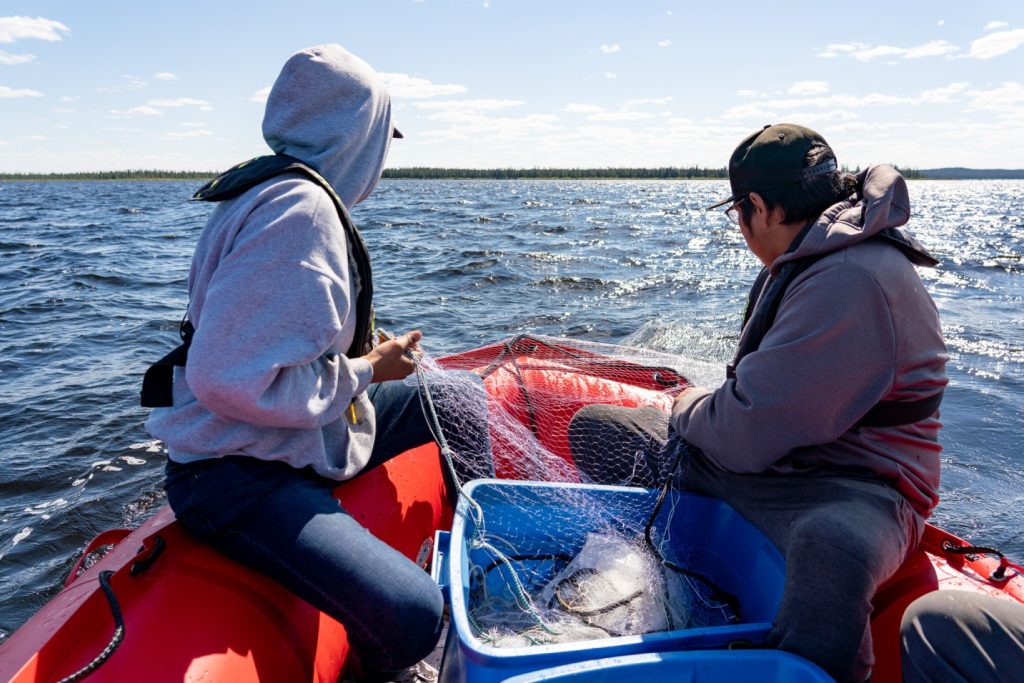
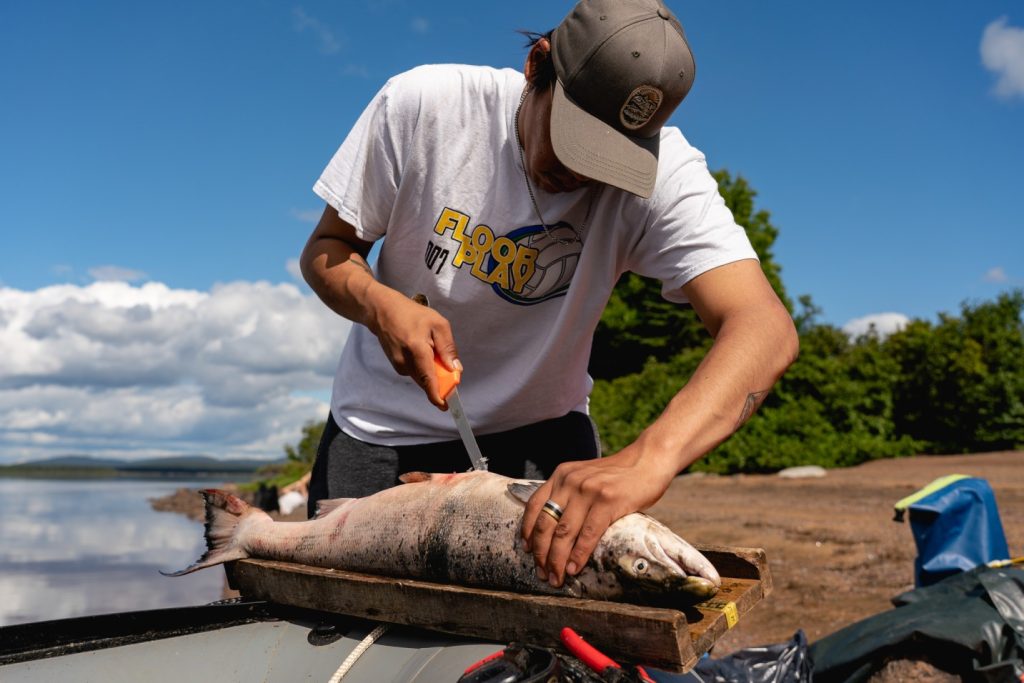
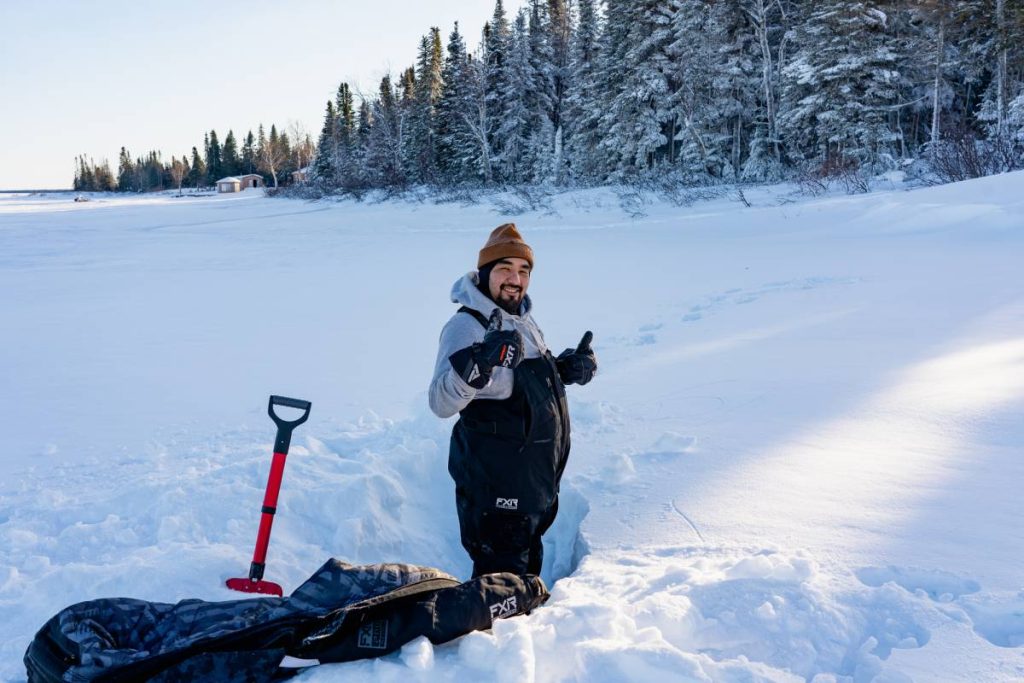
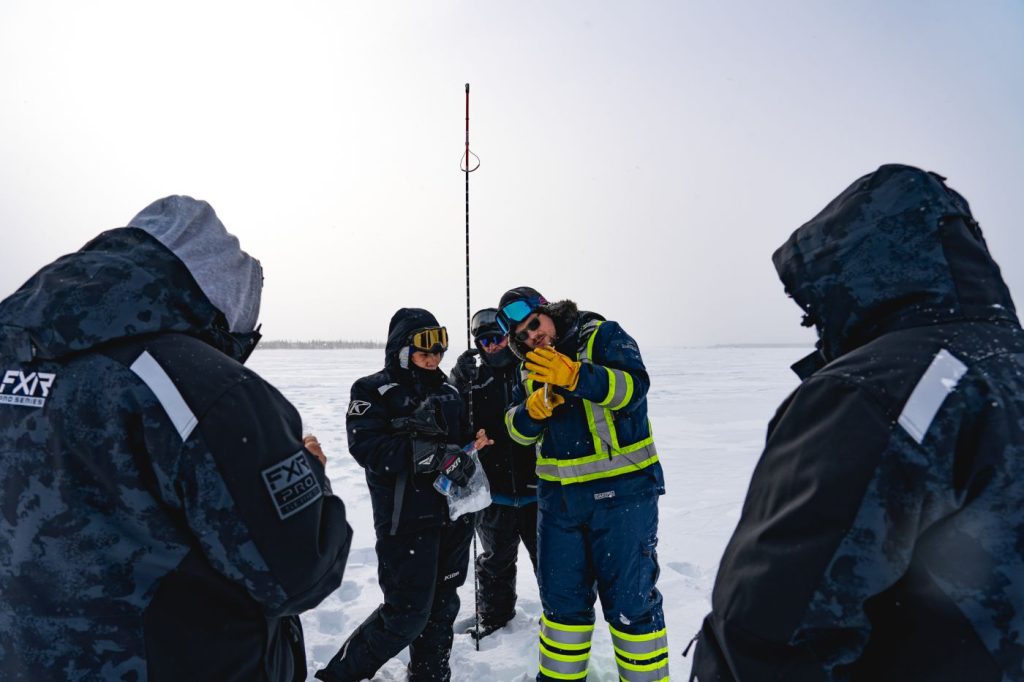
One of the guides, Seth Hurley, presented on the project at the Labrador Research Forum, a biennial forum dedicated to sharing knowledge, experience, and innovations about diverse research happening all over Labrador. This was an exciting opportunity for Seth and the project team to share their findings and learnings.
The team’s visit to Park Lake in February for a winter water monitoring workshop was a very different experience from the summer – with temperatures getting below -30 degrees and snowdrifts high enough to bury buildings. Interns from Sheshatshiu Innu First Nation and Naskapi Nation of Kawawachikamach learned about the importance of winter water monitoring and explored the safe use of different techniques. In addition, participants heard from a local Knowledge Keeper from Sheshatshiu, Jean Pierre Ashini, who led a session that covered topics such as survival on the land and Innu history.
Strengthened capacity for aquatic stewardship and management with Innu Nation
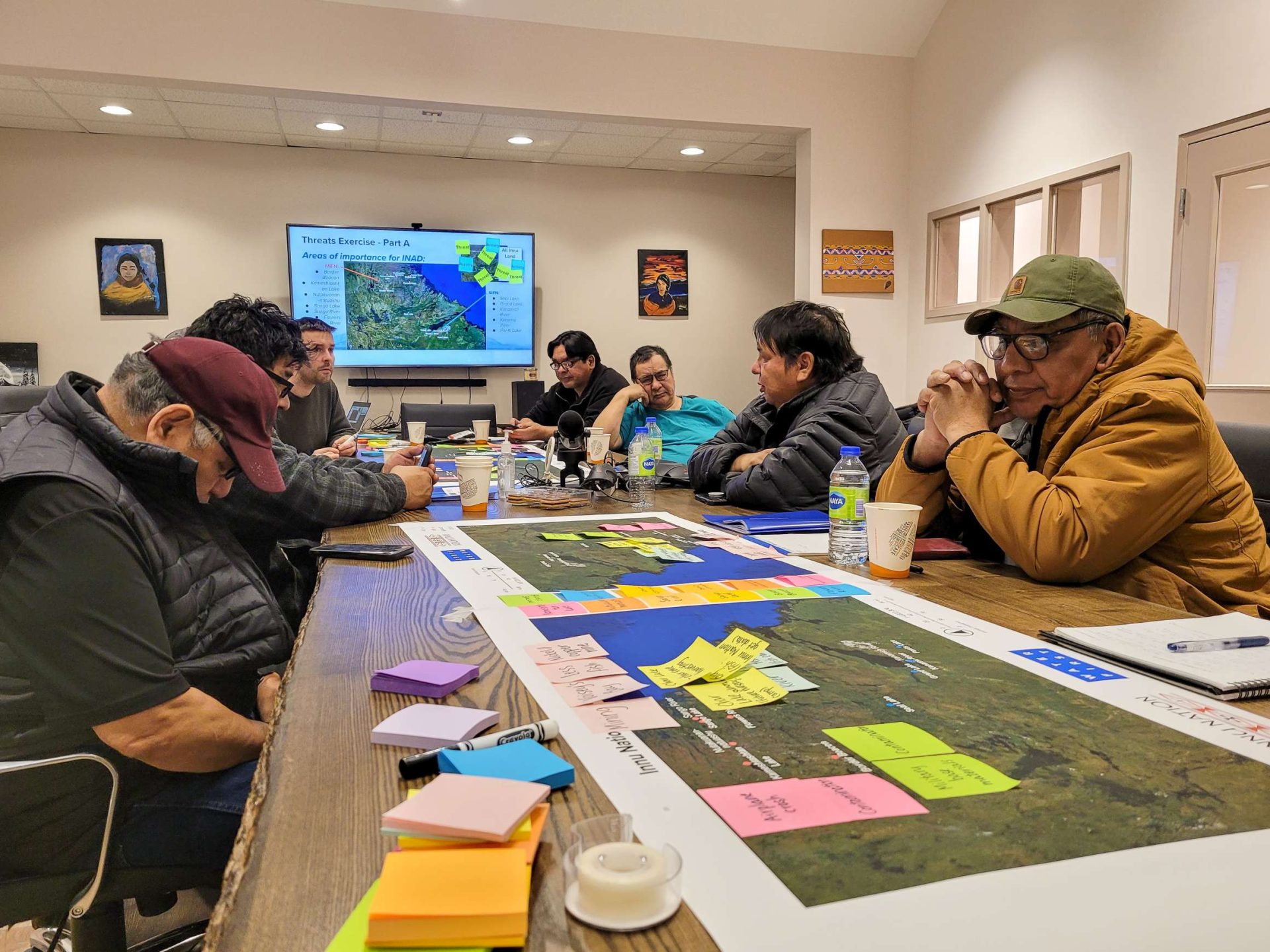
Last year, Innu Nation in Labrador approached us for support in applying for funding to create an Aquatic Resource and Oceans Management Department. Not only was the application successful, but Water First continued to support Innu Nation with developing a strategic plan for the department – working with Innu Nation Guardians – and collaborated on a cumulative effects workshop.
All this work will inform Innu Nation’s stewardship and management decisions related to fish and aquatic resources into the future. We look forward to continuing this collaboration.
A labour of love in Long Point First Nation
Long Point First Nation (LPFN) Fish Habitat Coordinator Nathalie Mathias and her daughter Kayla did the heavy lifting on a fish habitat project – literally! The project involved moving more than 10 metric tonnes of rock from the source pit to the dam site to support walleye spawning. Kudos to Nathalie and Kayla for their hard work and commitment to local walleye populations.
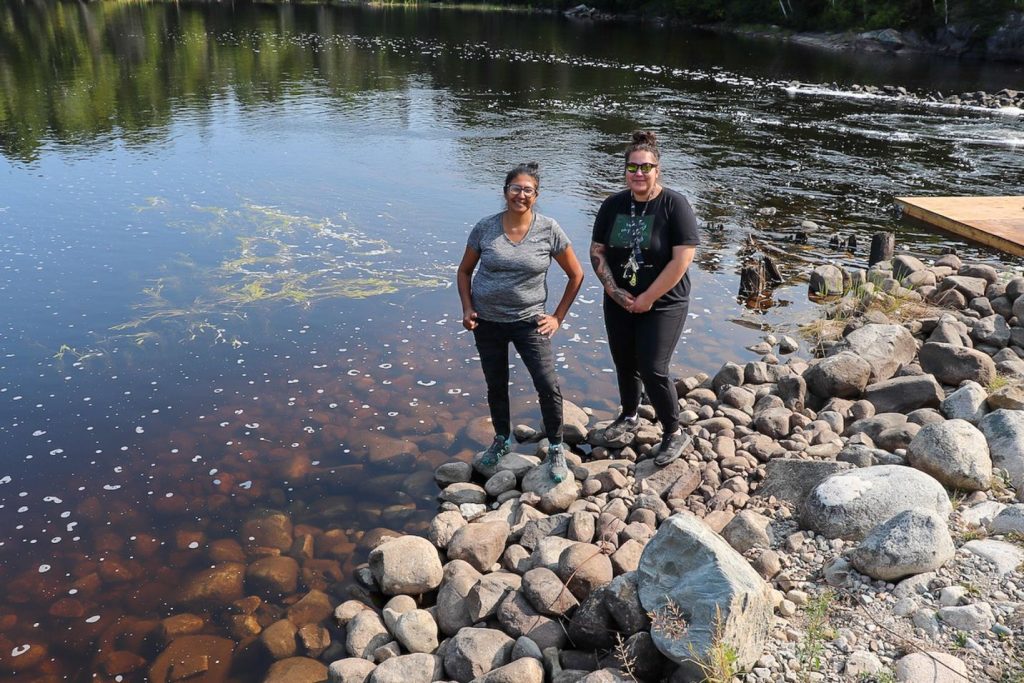
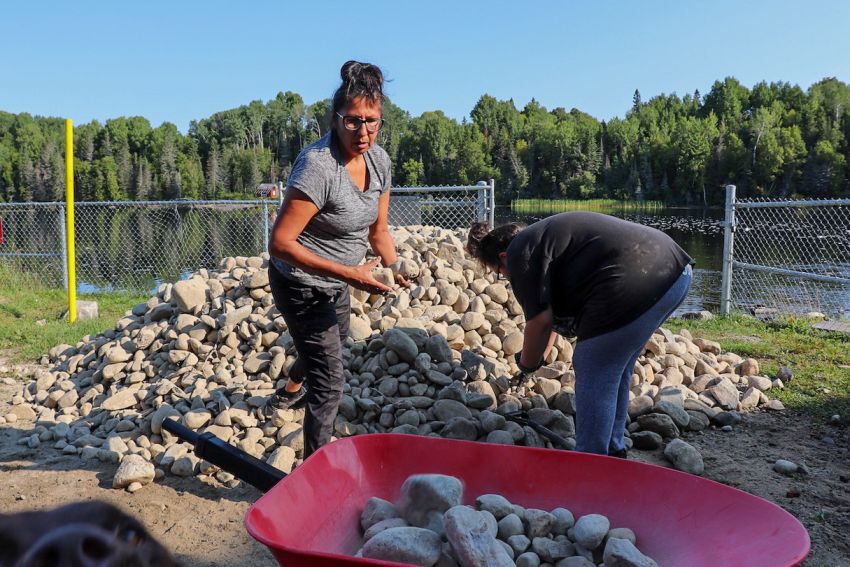

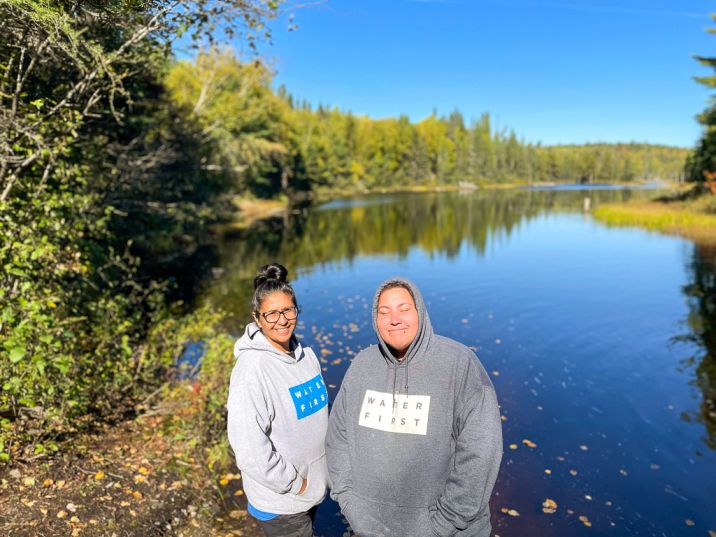
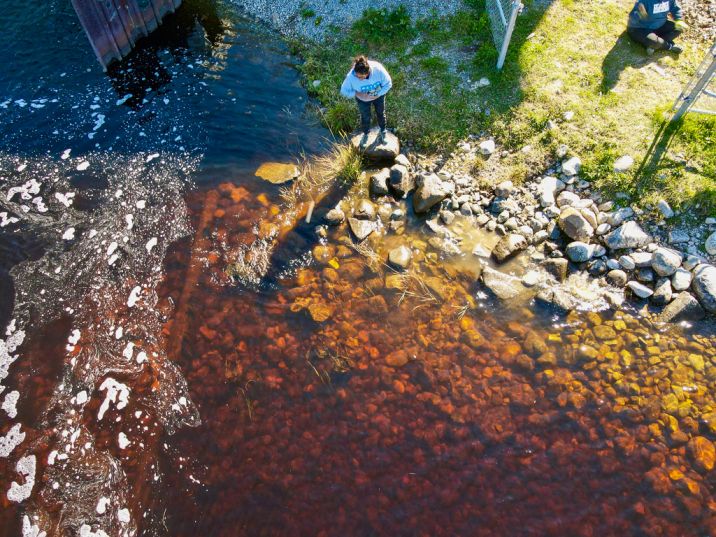
Monitoring water quality in Lake Dana with Cree Nation Government
In 2019, the Cree Nation Government (CNG) received funding for a protected area program to support water quality projects. Water First was invited to work with CNG to gather data that will help quantify water quality in Lake Dana and train community members to be able to continue collecting data independently and for the long run. The technical water science skills training program is equipping community members with the skills, capacity and confidence to be able to assess changes – like whether the lake is getting muddier, staying the same or getting cleaner. 2023 is the second year of the collaboration with CNG and the Cree Nation of Nemaska. This year’s project is a refresher training for participants in last year’s project and training for new participants.
Collaboration and skills development – across programs and among communities
Last summer, interns from Water First’s Drinking Water program joined interns from the Environmental Water program for three days of training. Seven interns from six communities, along with Water First staff, gained their CABIN (Canadian Aquatic Biomonitoring Network) certificate. CABIN is a training program run by Environment & Climate Change Canada that equips participants with the knowledge and skills to assess watershed health by looking at bioindicators like benthic (or bottom-dwelling) invertebrates.
The training was an opportunity for Drinking Water interns from Dokis, Shawanaga and Wasauksing First Nations and Environmental Water interns from Long Point First Nation, Sheshatshiu Innu First Nation and Sagamok Anishnawbek Nation to spend time together. Everyone stayed in cabins just outside Long Point First Nation together, so they could share local dishes, chat about language differences, and learn about each other’s experiences in different Water First programs.
The most rewarding part of this experience was bringing these amazing, passionate individuals together so they could connect with other Indigenous leaders in water sciences to advance their skills and knowledge.
More exciting collaborations on the horizon
A community-based fish habitat restoration and education project in the Spanish River Watershed:
This project is a collaborative effort between Water First and Sagamok Anishnawbek First Nation. A few of our team members travelled to Sagamok Anishnawbek earlier this month to do initial walleye monitoring and host a community open house.
A new Environmental Water Internship:
This exciting new offering will be piloted in 2024-2025, and has emerged through the growth and evolution of the Environmental Water Program. The program will provide paid internships to Indigenous youth and young adults to develop technical and employability skills and achieve certifications to work in water and fish resource management within or near their own communities. Water First’s internship model has been successfully tested and delivered through the Drinking Water Internship Program since 2017. Watch for more about the internship to come!

